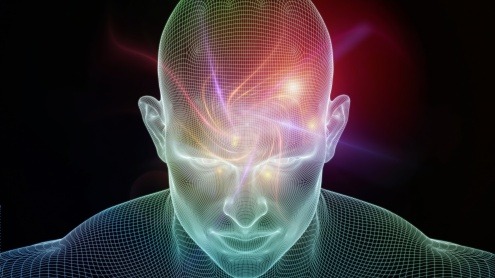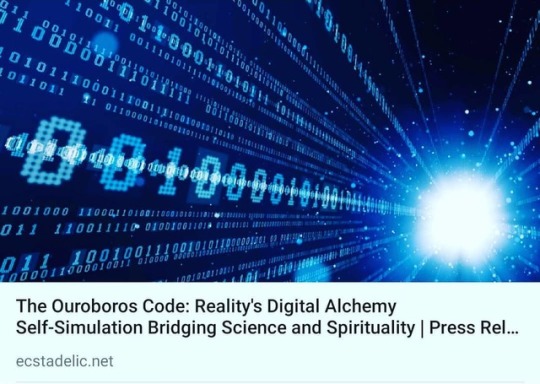#hardproblem
Explore tagged Tumblr posts
Text
"How could the 1.4kg lump of moist, pinkish-beige tissue inside your skull give rise to something as mysterious as the experience of being that pinkish-beige lump, and the body to which it is attached?"
0 notes
Text
What is consciousness, really?
Modern science tells us it’s just the brain — neurons firing, signals moving, chemistry at work. But that still doesn’t explain why it feels like something to be alive. Why do we experience colors, emotions, memories? Why does any of it feel real?
This short video explores the “hard problem of consciousness” — the deep mystery of how subjective experience arises from physical processes.
Perfect for those interested in neuroscience, philosophy, spirituality, and the nature of the self.
Save this if you're on a journey to understand what it truly means to be conscious.
#Consciousness #HardProblem #PhilosophyOfMind #SubjectiveExperience #SpiritualAwakening #Neuroscience #DeepThinking #Awareness #SelfDiscovery #MindMystery
1 note
·
View note
Text
Is the body key to understanding consciousness? | Consciousness | The Guardian
"Is the body key to understanding consciousness?", The Guardian asks
Is the body key to understanding consciousness? | Consciousness | The Guardian Illustration by Paul Tansley/Observer Design. In all the years now spanning more than a decade of fairly concerted personal study of consciousness and all the phenomena by which it expresses, I’ve arrived at that hypothesis as well, i.e. that you can’t think consciousness without taking the entire body into greater…

View On WordPress
#Consciousness#emergence#EN#hardproblem#mind#MindMatterGap#mindmatterproblem#neuralcorrelates#Neurology#neuroscience#Philosophy#sentience
0 notes
Photo

What if our reality experience is the product of a code? Could such a code provide a subjective experience? What are the characteristics of such a code? A must read for scientific spiritualists and spiritual scientists, this masterpiece of digital theosophy delivers to you a host of complex concepts and abstract ideas as an enthralling conceptual journey into the heart of digital alchemy, this coveted bridge between advanced science and transcendental metaphysics! https://www.ecstadelic.net/e_news/the-ouroboros-code-realitys-digital-alchemy-self-simulation-bridging-science-and-spirituality-press-release #OuroborosCode #SelfSimulation #PrimaMateria #consciousness #HardProblem #ArtificialIntelligence #nanotechnology #transhumanism #TechnologicalSingularity #InformationTechnology #simulation #SubjectiveExperience #spirituality #metaphysics #eschatology #neotranscendentalism #DigitalPhysics #DigitalPhilosophy #DigitalTheology https://www.instagram.com/p/B3f3F1OHkLk/?igshid=16wzp7ooqejyr
#ouroboroscode#selfsimulation#primamateria#consciousness#hardproblem#artificialintelligence#nanotechnology#transhumanism#technologicalsingularity#informationtechnology#simulation#subjectiveexperience#spirituality#metaphysics#eschatology#neotranscendentalism#digitalphysics#digitalphilosophy#digitaltheology
0 notes
Photo

Tags: #artofconfusion #artofmystery #conscience #consciousmind #dailydoodles #dailydrawings #davidchalmers #depressionart #drawingoftheday #hardproblem #infinitedesign #metaphor #mobileart #mobiledrawing #mysteryart #originalart #sinking #solipsism #solipsisme #solipsismo #solipsismus #solipsyzm #thoughtexperiment #valixtart #vectordrawing #withoutwords #wittgenstein #солипсизм #유아론 #意識 https://www.instagram.com/p/Bw8uw9QlIYm/?utm_source=ig_tumblr_share&igshid=17hdj77ss98z8
#artofconfusion#artofmystery#conscience#consciousmind#dailydoodles#dailydrawings#davidchalmers#depressionart#drawingoftheday#hardproblem#infinitedesign#metaphor#mobileart#mobiledrawing#mysteryart#originalart#sinking#solipsism#solipsisme#solipsismo#solipsismus#solipsyzm#thoughtexperiment#valixtart#vectordrawing#withoutwords#wittgenstein#солипсизм#유아론#意識
0 notes
Link
Although we may be at a loss to explain precisely how this creative process occurs (because it unfolds almost totally beyond the reach of self-reflective introspection) the clinical evidence nevertheless forces us to acknowledge something is happening that has important implications for our views about what is and is not possible in nature.
0 notes
Quote
これは面白かった。3D処理はAffine変換に立脚するので、3D向けに最適化されたGPUが同様にAffineを行うNNと相性が良いのは偶然ではない。記事からは、GPUが辿ったのと同じようにBranch処理が今後NNチップ設計時のHardProblemになることも示唆される https://t.co/yc6QmQp4mr— Hak Matsuda (@hak) May 24, 2018
http://twitter.com/ksk_oue/status/999912862653988864
1 note
·
View note
Text
Great piece on consciousness
This might be the best-written, most intedisciplinary summary I’ve ever read on the debate on consciousness throughout history.
Written by the female scientist-artist who I now greatly admire, Margaret Wertheim.
https://aeon.co/essays/how-and-why-exactly-did-consciousness-become-a-problem
How exactly did consciousness become a problem? And why, after years off the table, is it a hot research subject now?
Some quotes:
“Just as art became literal rather than iconic with the advent of modern science, our concept of a moral universe became subject to homogenisation, and finally to a kind of erasure.
Once we take our universe to be a mathematical arena, a question arises as to where in this scheme the realm of the soul might be found”
“For while Descartes championed mathematical science as a way forward for understanding the physical world, as a Catholic, he also insisted on the reality of the Christian soul. Hence his famous dualism, with its two domains of being: the res extensa (the extended realm of matter in motion), and the res cogitans (the realm of thoughts, feelings, emotions and moral action).”
“Henry James, Marcel Proust and Franz Kafka propel us into the unique sensibilities of their protagonists. James, whose writing has been likened to a literary version of impressionism, was deeply interested in representing the consciousness of his characters, while his brother, the psychologist and philosopher William James, gave us the term ‘stream of consciousness’ to describe the flow of thoughts, feelings and ideas that ramble through our minds. James coined this term in his book The Principles of Psychology (1890), and in the early decades of the 20th century it came to be associated with such quintessentially modernist writers as James Joyce.”
“With the advent of quantum mechanics they found that, in order to make sense of what their theories were saying about the subatomic world, they had to posit that the scientist-observer was actively involved in constructing reality. At the subatomic level, reality appeared to be a subjective flow in which objects sometimes behave like particles and other times like waves. Which facet is manifest depends on how the human observer is looking at the situation.”
“Forty years ago, the American theoretical physicist John Wheeler proposed a series of thought experiments to test if an observer could affect whether light behaved as a particle or a wave and, in 2007, the French physicist Alain Aspect proved that they could. Just this April, Nature Physics reported on a set of experiments showing a similar effect using helium atoms. Andrew Truscott, the Australian scientist who spearheaded the helium work, noted in Physics Today that ‘99.999 per cent of physicists would say that the measurement… brings the observable into reality’. In other words, human subjectivity is drawing forth the world.”
“This is all thrilling science, yet a question remains: will any of it explainsubjective experience? Chalmers, the philosopher, claims that the problem of experience is not mechanistically reducible and he argues that it will ‘persist even when the performance of all the relevant functions is explained’. In other words, he says, no amount of detail about neuronal potentials and interconnection is going to get us to the essence of subjectivity.Plenty of neuroscientists, physicists and philosophers disagree with him, but I’m on his side”
“Neurological and informatic models of subjectivity will no doubt have their uses and values, as did mechanistic models of the world before them. Yet, like their mechanistic forebears, these theories are grounded in an insistence that subjectivity is a secondary phenomenon whose explanation resides in something prior. Chalmers wants to insist, along with Descartes and Locke before him, on the primacy of subjective experience or, as the philosopher Bitbol puts it, ‘that consciousness is existentially primary’.”
0 notes
Quote
How does any activity or process in the brain result in an inner personal experience? Why doesn’t it all go on in the dark, without any awareness? The philosopher David Chalmers has dubbed this the “hard problem” of consciousness. How can something as immaterial as consciousness ever arise from something as unconscious as matter?
From the book "The New science and the spiritual reader"
0 notes
Text
Will we ever define the conscious mind? | Big Think
Will we ever define the conscious mind? | Big Think
Will we ever define the conscious mind? – Big Think Credit: agsandrew / Adobe Stock The hard problem of consciousness as Australian philosopher famously coined it, might remain an enigma forever, reasons Joseph Jobelli in his book How the Mind Changed: A History of our Evolving Brain. I’d have to quote Goedel’s incompleteness theorems here that basically prove that you can’t explain a system…

View On WordPress
#cartesiandualism#chalmers#Consciousness#Dualism#EN#goedelescherbach#goedelstheorems#hardproblem#hardProblemOfConsciousness#HistoryOfEvolvingBrain#josephjobelli#mind#mindbodydualism#MindOverMatter#Philosophy
0 notes
Photo

Tags: #artofconfusion #artofmystery #conscience #consciousmind #dailydoodles #davidchalmers #drawingoftheday #hardproblem #infinitedesign #insteadofwords #metaphor #mobileart #mobiledrawing #mysteryart #originalart #riddle #solipsism #solipsisme #solipsismo #solipsismus #solipsyzm #thoughtexperiment #valixtart #vectordrawing #withoutwords #wittgenstein #солипсизм #유아론 #意識 #独我論 https://www.instagram.com/p/Bw1T2B0lV23/?utm_source=ig_tumblr_share&igshid=kjvu66wfme7a
#artofconfusion#artofmystery#conscience#consciousmind#dailydoodles#davidchalmers#drawingoftheday#hardproblem#infinitedesign#insteadofwords#metaphor#mobileart#mobiledrawing#mysteryart#originalart#riddle#solipsism#solipsisme#solipsismo#solipsismus#solipsyzm#thoughtexperiment#valixtart#vectordrawing#withoutwords#wittgenstein#солипсизм#유아론#意識#独我論
0 notes